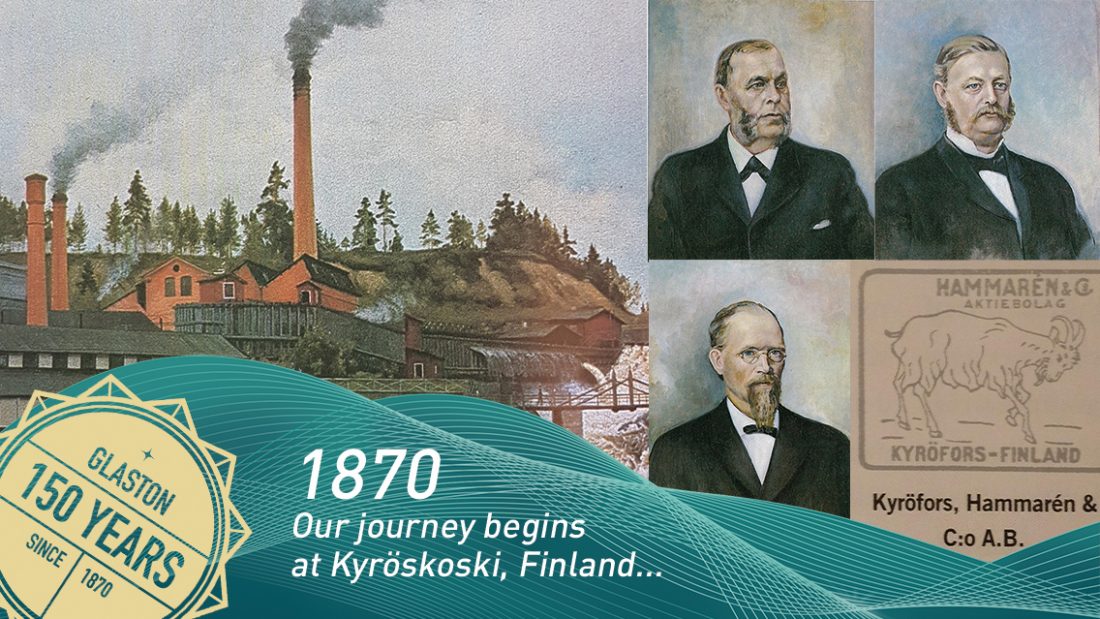Glaston celebrates 150 years of world leading glass processing technology
The Glaston Corporation’s roots extend back to 1870, when the company Hammarén & Comp was established at the Kyröskoski rapids.
Throughout their history, the company has evolved from a traditional forest industry company into the world’s leading glass processing technology company. For 150 years, quality, development of new technologies and internationalization have been strongly present in Glaston’s operations.
Operations focused on forestry and paper at the successful Kyröskoski Works since Glaston was established. Ever since the days of their founders, the company has continuously developed its operations and, in order to respond to changing circumstances in both domestic and foreign markets, has seized business opportunities beyond the country’s borders. In addition, utilization of new technologies to secure efficient, high-quality operations has been an enduring characteristic of the company. The company has exported products since 1907.
In 1909, Hammarén & Comp became a limited company, and in 1941 the company’s name was changed to O/y Kyro A/b.
A major change in Kyro’s business took place in the 1980s, when the company’s management decided in 1981 to diversify its operations. With the acquisition of Tamglass Oy, operations expanded beyond traditional forest industry into glass processing. The company became a conglomerate. Tamglass, which specialized in the manufacture of laminated and tempered safety glass and particularly the sale of tempering machines and technologies, rapidly developed into a leading manufacturer of tempering machines.
From the middle of 1980’s onwards, acquisitions were focused on glass processing technology, and the company began to specialize increasingly on flat tempering technology and its development.
From 1990 to 2000, Kyro saw a transformation in which the company evolved from a forest industry company into a modern and international technology group. In 2007, Glaston Corporation, specializing in glass processing technologies, was born. In 2019, the company took the next big development step with its acquisition of the Swiss-German company Bystronic glass with the ambition to further strengthen its position in the glass processing value chain.
Cooperation and innovation
The company’s goal has always been to play the role of a reliable and responsible partner and since their founding have been actively involved in the development of the industry. A great example of this is Glass Performance Days (GPD) conference, the industry’s leading international conference, organized by Glaston. The forum’s objective is to gather and share the latest information among the industry’s operators.
Glaston is known to be the frontrunner in glass processing technologies and was among the first players in the industry to seize the opportunities presented by the digital age. At the forefront of their product development has been digital and IoT-based solutions and services that enable the optimization of machine performance and the transition to fully automatic glass processing. Development of new sensor, processing, interface and cloud service technologies make Glaston products better, more efficient and more reliable.
For customers this means ease of use and higher efficiency. Digitalization is also evident in the modernization and upgrade products they offer, which enable customers to monitor production in real-time and to digitize their operations with their present machine stock. Glaston will continue to be in the forefront of development and innovation, smarter than before, with new machines and services to create new opportunities and help their customers keep one step ahead.

Industry visionary
For 150 years, Glaston has been a frontrunner and visionary, who have boldly seized new opportunities in both technology and business, first in the forest industry and, since the 1980s, increasingly more focused on the glass processing industry.
Today, glass processed on their glass processing machines is delivered to the architectural, automotive, solar energy and appliance industries.
By volume, most of the glass manufactured with Glaston’s technology is supplied to the construction industry.
Glaston operate’s in eleven countries around the world in production, services and sales and has around 800 employees.





























